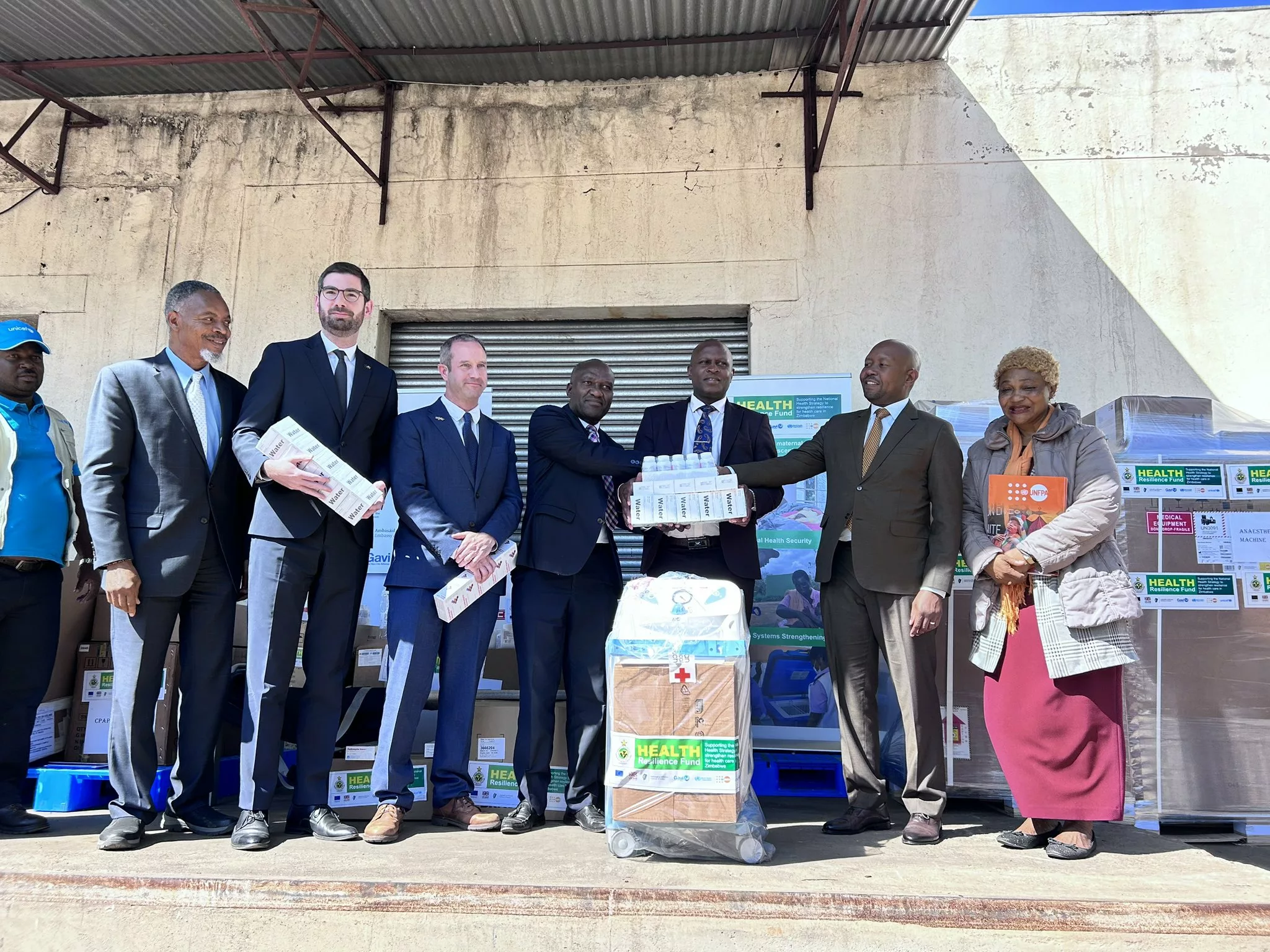|
Getting your Trinity Audio player ready...
|
Today, the Health Resilience Fund (HRF) handed over to the Ministry of Health and Child Care (MOHCC) critical medical equipment and supplies worth USD$9.2 million procured through the technical support of the United Nations Population Fund (UNFPA) and the United Nations Children’s Fund (UNICEF).
The handover of this equipment held at the National Pharmaceutical Warehouse in Harare marks significant strides in the enhancement of Zimbabwe’s healthcare infrastructure and services.
The HRF is a pooled fund that benefits from financial contributions under the coordination of the Ministry of Health and Child Care to improve health care for vulnerable mothers, newborns, children, and adolescents in Zimbabwe. Its funding partners are the European Union, the Governments of Ireland and the United Kingdom, and Gavi, the Vaccine Alliance, while UNFPA, UNICEF, and WHO are the technical partners of the Fund. The Fund supports three health pillars: ending preventable maternal, newborn, child, and adolescent deaths; global health security; and health systems strengthening.
“The target populations of the Health Resilience Fund are women, adolescents, girls, and children who are at risk of being left behind in the provision of basic essential health services,” said HRF Co-Chair and Programme Manager at the Embassy of Ireland Mr Dumisile Msimanga.
He added: “The provision of these advanced medical supplies and equipment is a cornerstone of our efforts to ensure equitable access to quality healthcare for all Zimbabweans. The HRF places a strong emphasis on sustainable and long-lasting investments that will stay on, well after the end of the programme, and what we are witnessing here today is a good example. Our commitment is to foster a resilient, responsive, and robust healthcare system.”
The handover includes a comprehensive array of medical supplies and equipment specifically targeted at improving maternal and neonatal health outcomes including:
- ICT Equipment: Essential for E-learning, modernizing health information systems, enabling efficient data management, and supporting telemedicine initiatives.
- Fistula Repair Kits: Crucial for the surgical repair of obstetric fistula, a severe childbirth injury that can be life-threatening and severely debilitating for affected women.
- Manual Vacuum Aspiration (MVA) Kits: Used for safe, manual post-abortion procedures, helping to reduce maternal mortality from unsafe abortion practices.
- Anaesthetic Machines: Vital for ensuring safe and effective anesthesia during obstetric and other surgical procedures, thereby improving surgical outcomes.
- Operating Theatre Tables: State-of-the-art tables designed to enhance surgical efficiency and patient safety.
- Neonatal Incubators: Essential for providing a controlled environment for premature and critically ill newborns, significantly improving their chances of survival.
- Phototherapy Machines: Used to treat neonatal jaundice, a common condition in newborns that, if left untreated, can lead to severe complications.
- Non-Pneumatic Anti-Shock Garments: Life-saving devices that help stabilize women suffering from obstetric hemorrhage, one of the leading causes of maternal death.
- Tranexamic Acid: A medication that reduces bleeding, crucial for managing postpartum hemorrhage.
- Oxytocin: A hormone used to induce labor and reduce postpartum hemorrhage, essential for managing childbirth and preventing maternal deaths.
- Maternal Health commodities.
- Cholera response supplies.
- Essential medical commodities.
- Ready to use therapeutic food to treat malnutrition.
Speaking at the handover ceremony UNFPA Representative Ms. Miranda Tabifor said the lifesaving equipment and commodities will support Zimbabwe’s efforts in ending the deaths of women while giving life. At least 5 women die each day in child birth due to preventable causes.
“UNFPA remains unwavering in its commitment to supporting the Ministry of Health and Child Care in Zimbabwe. This handover is a testament to our ongoing partnership and our dedication to addressing critical gaps in maternal and newborn health services. The equipment and supplies provided today are not just items; they are the difference between life and death for women.”
UNICEF Representative Dr. Nicholas Alipui highlighted the value of the HRF citing the collaboration between the development and technical partners under the coordination of the MOHCC will help improve access to basic health services for the people of Zimbabwe.
“The procurement and distribution of these commodities and equipment will contribute to the quality of care and access to services, and the strengthening of the health system in Zimbabwe for women and children,” Dr. Alipui said.
Implemented through Government ministries and partners, the HRF is aligned with Zimbabwe’s National Development Strategy 1 (NDS1) and the National Health Strategy (NHS) 2021-2025.
“We extend our deepest appreciation to the funding partners of the Health Resilience Fund for this generous and timely support,” said Deputy Minister of Health and Child Care, Honourable. Sleiman T. Kwidini.
He added: “These commodities and equipment are critical assets in our ongoing efforts to improve health outcomes for mothers and newborns across Zimbabwe. This support not only enhances our clinical capacities but also strengthens our overall health system resilience. The Health Resilience Fund is a powerful example of how strategic partnerships can drive sustainable improvements in healthcare delivery, ultimately leading to better health outcomes for all.’






